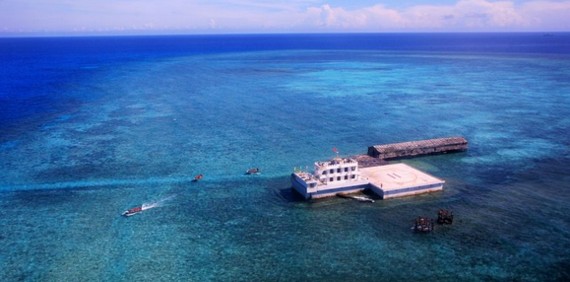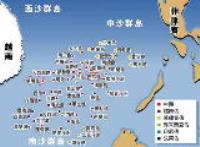
|
| 南海赤瓜礁(資料圖) |
【Threat or Use of Force】
The greatest contribution made by UN Charter on the development of international law on the use of force is the basic prohibition of the use of force contained in Article 2(4). It provides that ‘All Members shall refrain in their international relations from the threat or use of force against the territorial integrity or political independence of any state, or in any other manner inconsistent with the purposes of the United Nations’. While this general rule banning the threat or use of force per se is open to controversies and divisions among both states and scholars, it constitutes the corner stone and the starting point when discussing the international law on the use of force since UN Charter. This general prohibition admits of two exceptions: the use of force by states in individual or collective self-defense, based on Article 51 of the UN Charter, and the use of force as part of collective enforcement measures authorized by the UNSC, based on Article 42 of the UN Charter.
China has faithfully observed this general rule of international law on prohibition of the use of force in practice. For 36 years since its last border war with Vietnam as an exercise of the right of self-defense in 1979, China has never fought a war with any states, not to say the use of force in settling territorial disputes. The latest case I learned in my international law class with regard to the settling of maritime disputes through the use of force is the use of force by UK in the 1982 Falkland War against Argentina. In fact, China has settled territorial issues with 12 out of its 14 land neighbors by conducting friendly consultations and signing bilateral agreements, and as well has signed its first maritime delimitation agreement with Vietnam in the Bei Bu Gulf in 2000. None of those agreements are reached through ‘the threat or use of force against the territorial integrity or political independence of any state’.
Another criticism regarding the threat or the use of force is that China as a big country bullying its neighboring small countries. Here I would like to give some facts and figures. On October 18, 2011, a Philippine navy warship encountered a large Chinese fishing ship that was towing small dinghies near the Liyue Bank in the South China Sea and seized 24 small dinghies. Was that a case of big country bullying small one?! On April 10, 2012, the Philippines' warship blocked the lagoon within the Huangyan Island, and their armed soldiers boarded the Chinese fishing boat which was conducting normal operations within the lagoon and forced the Chinese fishermen to take off their shirts under the sun for more than 2 hours. Was that a case of big country bullying small one?! On May 9, 2013, a Taiwan fishing ship called "Guang Da Xing No.28" was shot repeatedly by a Philippine public service vessel without warning, causing the death of the 65-year-old sailor Hong Shicheng. Was that still a case of big country bullying a small one?!
From 2011 to 2013, the Philippine military and police unilaterally used force at an increasingly higher frequency, sometimes violating Article 2, paragraph 4 of the Charter, which demanded all UN members to refrain in their international relations from the use of force, but China still maintained utmost restraint. From a scholar's perspective, I'm very interested to know, if Japan bought and nationalized Hawaii and if fishermen from the US, Japan or other countries suffered from the illegal use of force by foreign countries, what would those countries do?!
Finally, some countries blame China's legitimate military build-up as a threat to regional peace and accuse China of flexing of military muscles despite the fact that China has never used force against any country since the Sino-Vietnam border war and a more stronger China has been a stable force for maintaining peace and security in this region. The criticism is a senseless judgment born out of logics of absolute security. A case in point is that China is said to threaten a certain country when its missiles can reach some other country and its anti-satellite capability, if any, is powerful enough to destroy the satellites of some other countries. None of the other four permanent members of the Security Council has a missile range any lower than what China is capable of, and the United States have the world’s most powerful anti-satellite capacity, cyber-war capability and global military presence. Is it fair to say that the United States has posed a threat to world peace and stability? In determining whether a country is a positive or negative force for international peace and security, the key is to examine its national defense policy. A country is able to undermine world peace and stability even with conventional weapons if it upholds an aggressive policy. China is committed to peaceful development and a national defense policy which is defensive in nature. A stronger China is in a better position to maintain world peace and stability.
As for the flexing of military muscles, it's quite difficult to understand what are the international standards for this. The US has the largest military presence in this region in terms of military bases in Japan, South Korea, Australia, and other countries in this region. US warships and military aircrafts conducted military exercises quite often in this region. In fact, the US reconnaissance planes are visiting China's coastal area every day, every month, every year. I seriously doubt the American people as tax payers know the fact that their military vessels and aircrafts traveled thousands of miles to the door of other countries and keep an eye (not peep through the window) on their normal daily life day and night and accusing them of flexing of military muscles when they develop their military capability in their own home based on its security needs and international responsibilities. As a student of international law, I just couldn’t understand the logic behind it. If this is not hegemony, I would like to ask American people what is hegemony.
|

